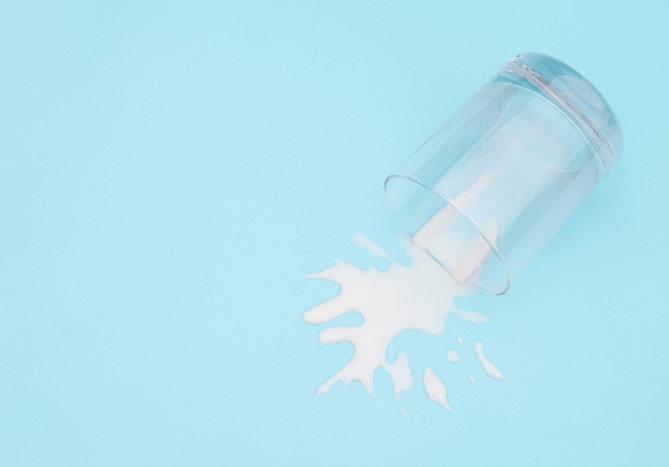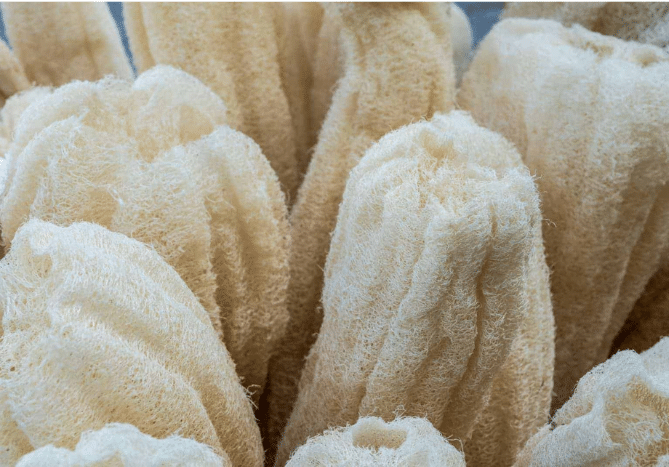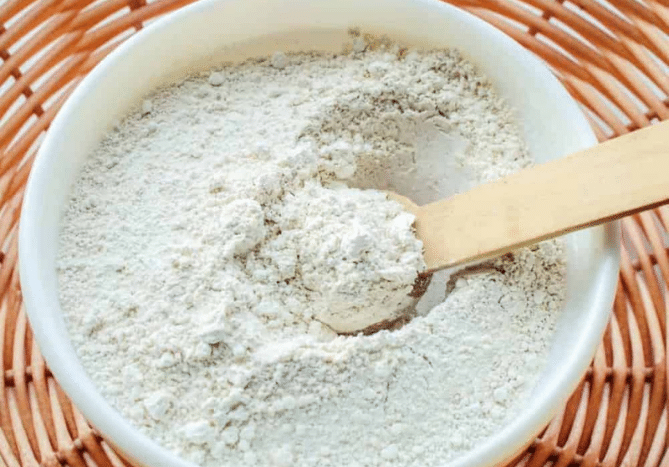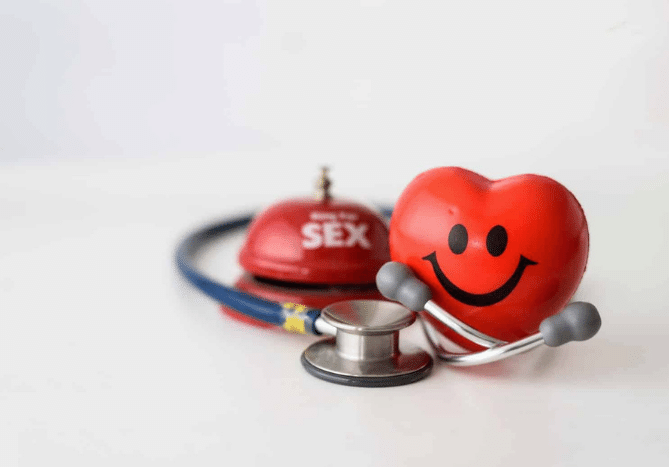Bent Penis? Could be a Damaged Tunica Albuginea
Bent Penis? Could be a Damaged Tunica Albuginea
The penis is a wonderful organ, but most men aren’t intimately familiar with the various anatomical parts of that organ and their functions. A more precise understanding of the penis can help to better understand one’s penile health. For example, many men who have a significantly bent penis – a condition known as Peyronie’s disease – may not know that their problem centers on the tunica albuginea.
Tunica albuginea 101
To learn about the tunica albuginea, it’s necessary to know a little about basic penis anatomy. Inside the penis are three cylinders. Two of these are the corpora cavernosa (which means cavernous bodies); and a third, much smaller cylinder is known as the corpus spongiosum, which lies underneath the corpora cavernosa. All three of these cylinders consist of a spongy tissue. Each of the corpus cavernosum are lined with a thin layer of tissue called the tunica albuginea. It may help to picture a hot dog. The outer skin casing is like the tunica albuginea, while the inner “meat” of the hot dog is like the corpus cavernosum.
When the penis becomes erect, the spongy tissue of the corpora cavernosa absorbs a greater flow of blood. This causes them to expand and harden. The tunica albuginea contain a fair amount of elastin, which enables them to expand as well, so they can “keep up” with the corpora cavernosa.
Bent penis problem
As we mentioned, Peyronie’s disease is a situation in which a man possesses a significantly bent penis, where the curve causes pain and/or penis function issues. In most cases, this bending occurs due to a problem with the tunica albuginea.
Peyronie’s disease comes about most often because of scar tissue developing in the penis. This frequently happens when there is trauma. It may be a one-time traumatic event, such as getting hit in the penis by a baseball, or it may be due to numerous small traumatic events, such as rough handling of the penis during sex or masturbation.
Very often, this scarring takes place in the tunica albuginea. The scar tissue is part of the healing process, but it does not have the elasticity necessary for an organ that changes size, as the penis does. When there is too much scar tissue, it overcomes the natural elasticity of the tunica albuginea. When the penis starts to become erect, the side of the penis with scar tissue cannot expand as much as the rest of the penis. Thus, the organ bends.
In addition to causing a bent penis, this scarring may prevent the corpora cavernosa from filling up with as much blood as they would otherwise. This can result in erectile function challenges.
Treatment
If a man has a severely bent penis, he should consult with his doctor, especially if it causes pain or interferes with sex. Sometimes, a bent penis resolves on its own. When it doesn’t, there are several medication options, including surgery.
Often, a bent penis, whether due to a scarred tunica albuginea or for other reasons, may become overly sore. Regular application of a top drawer penis health crème (health professionals recommend Man 1 Man Oil, which is clinically proven mild and safe for skin) may help reduce soreness. Seek out a crème that contains soothing moisturizing ingredients, such as shea butter and vitamin E. In addition, take pains to find a crème that also includes L-carnitine. A bent penis may sometimes result in de-sensitization of the penis. L-carnitine has neuroprotective properties that can help fight that unwelcome development.
Dry Penis Skin: Top Four Causes and Treatments
Dry Penis Skin: Top Four Causes and Treatments
Dry penis skin… it seemed harmless at the time. It was a small patch, a little sore, a little red, a little sandpapery, at the edge of the penis. Just slap some heavy moisturizer on there and forget it, right? Wrong. When the penis goes through stretching and shrinking, it can make healing hard. So, when does a guy go to the doc, and when does he DIY it? Let’s look at four common reasons for dry skin on the penis and how to fix this irritating problem.
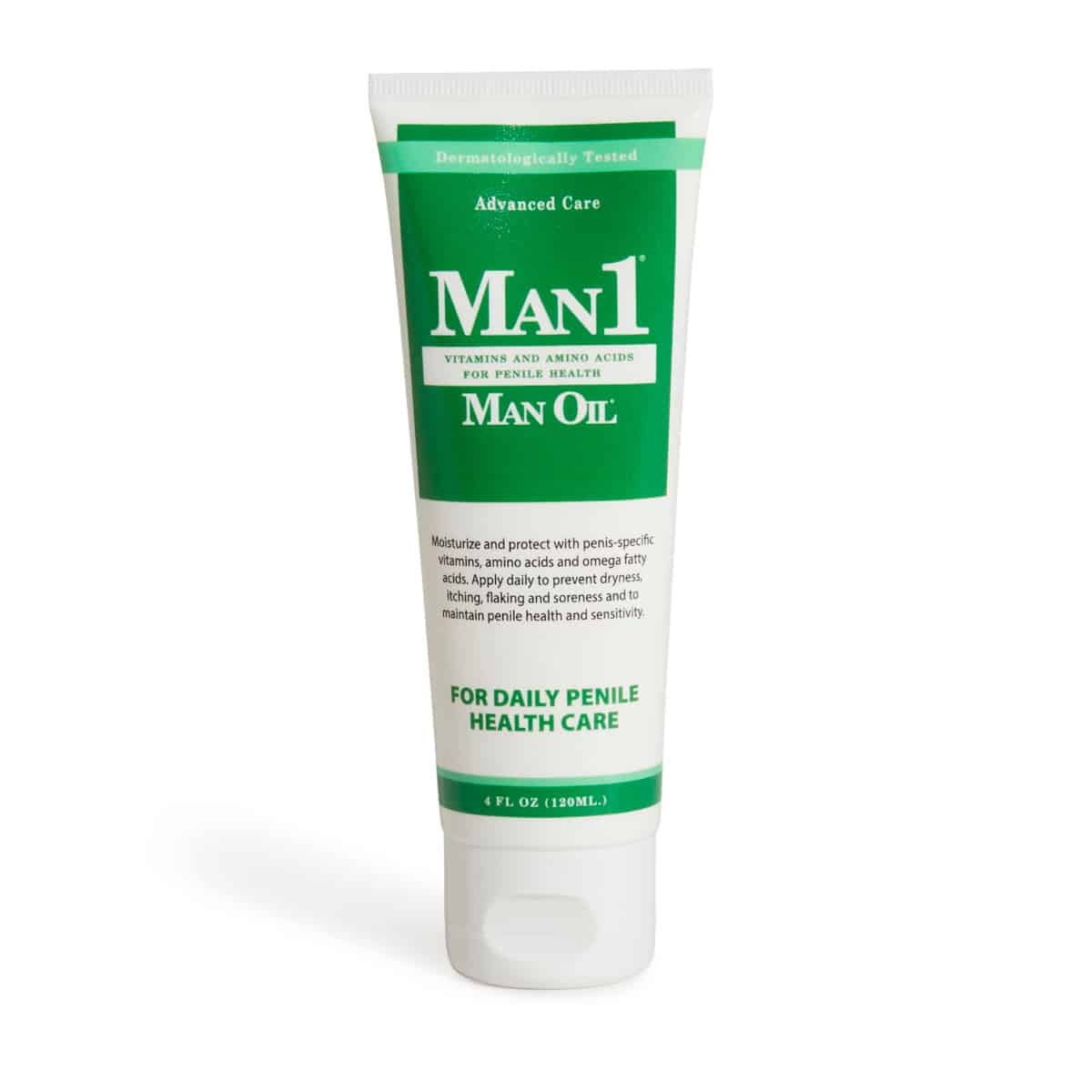
The first line of defense against penile skin dryness, itching, redness and loss of sensitivity.
Dry Skin on the Penis Culprit #1: Sudden itchy, red rash
It could be contact dermatitis, or what the common folk calls an allergic reaction. There are many things the penis may be less than fond of. Latex condoms are a surprisingly common allergy for both men and women. Also, a change of laundry detergent or soap could be causing the reaction. If all else fails, it may be a man’s partner(s). An allergic reaction could be to anything they use too. If something comes in contact with the Big D, it can cause an allergic reaction. Wash the area gently and rinse well. Pop a Benadryl to bring down the itch factor and make an appointment for an allergy test to get to the bottom of it.
Dry Skin on the Penis Culprit #2: Itchy, red rash where the leg and the groin collide
Sorry, but it’s probably jock itch. Jock itch is a highly contagious fungal infection that presents as a rash that can last for months. First things first:
Give it a good but gentle wash.
Switch to regular boxers so the area can get some air.
Use a powder like Gold Bond after toweling off to keep your business dry all day long. If the rash persists for more than a week, see the doc for an antifungal ointment.
Dry Skin on the Penis Culprit #3: A patch that’s greasy, yellow and prone to bleeding
It sounds gross, but it’s not hard to quell. It’s psoriasis, which is a chronic skin condition caused by an overactive immune system. In addition to dry skin on the penis, a man may find it in other places, like the scalp, elbow, and knees. Some say that swimming in saltwater can clear it up. Still, if a man doesn’t live ocean-side, he may want to use a hydrocortisone crème or a tar shampoo all over his body. If the condition worsens, head to the doctor for a topical steroid or nonsteroidal anti-inflammatory cream script.
< firm>Dry Skin on the Penis Culprit #4: Rash with white, powdery scales in skin folds
Hello, eczema. Eczema is also called dermatitis, and like psoriasis, it can turn up anywhere on the body. Use anti-itch lotions, and oatmeal bath soaks for relief. If it’s a pretty bad case, a doctor may prescribe a topical medication for treatment.
Some skin issues can’t be helped; however, many can. Smart men use a penis health crème (health professionals recommend Man 1 Man Oil, which has been clinically proven safe and mild for skin) daily to keep delicate penile skin balanced and healthy. The best creams will include ingredients such as vitamins A, B, C, D, and E to keep skin clear, bouncy, and silky soft. A good crème will also include Alpha Lipoic Acid, which protects the skin from harmful free radicals that take a toll and prematurely age the skin. Apply daily or any time after showering for best results
Penis Examination: Professional and at Home Checkups
Penis Examination: Professional and at Home Checkups
Everyone jokes about the “turn your head and cough,” but a penis examination is a pretty serious business. Let’s talk about both kinds of penis examinations: the one conducted annually by a man’s doctor and the monthly self-exam. These exams have been shown to save men’s lives time and time again.
Man1® Man Oil®
The first line of defense against penile skin dryness, itching, redness, and loss of sensitivity.
Paying a Professional for Penis Examination
Men should get annual exams. Unless they have a history of issues with the reproductive organs, most men can have their exams done by their regular doctor. There are four parts to the penis examination that involves more than just the shaft. Here’s what a man can expect when he drops his pants at the doctor’s office:
Penis Examination – The doctor will inspect the penis for any odd bumps, bruising, or rash. He may examine the foreskin if the man is uncircumcised to check for smegma overproduction or balanitis. The doctor will also inspect the penis for STIs, specifically warts or ulcers.
Testicular Examination – The doctor will check the testicles for lumps, change in size, or unusual tenderness or sensitivity.
Hernia Examination – This is the famous “turn your head and cough” mentioned above. This is where a doctor checks for any weakness in the abdominal wall located between the scrotum and the intestines.
Prostate Examination – See the latex gloves coming out? Assume the bent-over position because it’s time for the doc to insert a finger into the rectum to check the prostate, explicitly looking for its size and anything suspicious.
This in-depth examination should be performed annually and is a cornerstone of penis health and overall health. For example, for men diagnosed in Stage One for testicular cancer, the survival rate is 99 percent. Prostate cancer, the most common cancer for men after skin cancer, boasts a nearly 100 percent survival rate. See why it’s so important to get an annual penis examination from a pro?
DIY for Penis Health
In addition to their annual exam, men should also conduct a penis self-exam at least once per month. Not sure how to do it? We’ve got the simple how-to right here!
How to Perform a Monthly Penis Self-Exam
Giving yourself a penis examination is easy! It’s a quick four steps for peace of mind and optimal penis health each month that no man should skip. Here are the steps to follow:
Relax with a warm shower. Not only does this set a chill mood, but it also relaxes the muscles and rinses away anything on the penis that doesn’t need to be there, like dead skin, lint, or other junk on your junk.
Start the exam by inspecting the scrotum. Be on the lookout for any changes like skin texture or color.
Now lightly roll the testicles between the thumb and forefinger. Feel around for bumps or lumpiness. Also, be mindful of any areas that are more sensitive than usual. Note: Don’t be worried if there’s a small bump at the back of the sack. That’s the epididymis – it’s supposed to be there. If, for any reason, it’s painful, then tell a doc.
Last step! Look over the penis itself for lumps, blisters, bumps, sores, or discolorations. Do a once-over of the groin and inner things too! Normal wear-and-tear is okay, but rashes, lumps, or pain is something that a man should inform his doctor about soon.
To reiterate, if anything feels lumpy or unduly sensitive, see a doctor ASAP and get checked. Refrain from sexual contact or contact sports until the doctor okay’s it. It’s better to be safe than sorry!
Other Ways to Promote Optimum Penis Health
Penis health is not all examinations! Daily care and well-being contribute to overall wellness and a healthy, robust, and vigorous penis. Eat a healthy diet, get plenty of sleep, exercise every day, and have a stress management plan that’s enjoyable. Be sure to practice safe sex to avoid STIs and penile injuries.
Having a proper hygiene protocol also keeps irritation and infections away and keeps the penis in working order so it too can get a regular workout (nudge, nudge – wink, wink). Use a mild cleanser and warm water to wash the penis. It’s important to wash daily, after exercise, and after any sexual activities to keep the penis clean and bacteria-free. After cleansing, moisturize with a specially formulated penis health crème (health professionals recommend Man 1 Man Oil, clinically proven safe and mild for skin). This unique formulation of vitamins and nutrients wrapped up in Shea butter and vitamin E will not only soften the penis but protect it from damage and infection, boost blood flow for solid erections, and make skin strong. It’s the perfect way to achieve the highest level of penis health.
Semen Color: A Rainbow of Hues and What They Mean
Semen Color: A Rainbow of Hues and What They Mean
Semen — nope, it's not a bunch of men in a water-borne vessel. It's that secret man sauce that delivers potent swimmers to a warm place for reproduction or a long tube sock on a rainy day. Semen's healthy color is a whitish-gray color with a jelly-like texture. This fluid consists of various minerals, proteins, hormones, and enzymes that all affect its color and texture. Believe it or not, semen color can change, and these changes serve as an indicator of what's going on in a man's body. Read on to find out what yellow, green, brown, and other colors may mean.

The first line of defense against penile skin dryness, itching, redness and loss of sensitivity.
Semen Color: Clear, White or Gray
If semen is clear, white, or grayish, it’s considered normal, healthy spunk. No need to worry here!
Semen Color: Yellow or Green
If semen coloring takes a yellow or greenish tinge, it could mean several different things:
- Urine in the semen – Sometimes, a bit of urine gets caught up in the urethra. If a man ejaculates shortly after urinating, it’s no big deal. If it happens well afterward or continues to happen regularly, it could be a urinary tract infection, an enlarged prostate, or infection in the reproductive area. Seek medical attention immediately.
- Diet – What a man puts into his body is bound to affect what comes out of it. Foods containing intense yellow hues (like curry) can turn a man's semen color yellow. A good rule of thumb is if it can turn a kitchen countertop yellow, it can do the same to a man's semen. Foods high in sulfur can also cause a yellowish hue.
- Jaundice – When too much bilirubin builds up in the liver, it can cause the skin, eyes, and even semen to take on a pale yellow tone. Other symptoms of jaundice include abdominal pain, fever, and chills. See a doctor right away.
Semen Color: Red, Pink, Orange, or Brown
Let's break it down by color family. A red or pink tinge to a man's ejaculate is generally a sign of fresh blood. An orangey-brown tint is usually an indicator of older blood that's been exposed to oxygen. Both of these color blood-adjacent tinges are referred to medically as hematospermia and can be associated with several things such as:
- High Blood Pressure – Hypertension has a high chance of showing in semen color. This is also occasionally accompanied by frequent headaches, bloody noses, and shortness of breath. Hypertension is a mortal illness, so seek help immediately.
- STI's – Herpes, chlamydia, and gonorrhea are all known to include bloody semen as a symptom. Get tested and get treated!
- Going Too Hard in the Paint – Overly vigorous sex or self-pleasure can cause tears in the delicate penile skin which can lead to bleeding. Conversely, not ejaculating for a long time can also lead to bleeding. Good news? It's nothing to worry about. Regularly work the muscle with care, and all will be good.
- Prostate Issues – Prostate biopsy, surgery, or infection can all produce a change in semen color. Consult a doctor about treatment.
- The C Word – In very rare (RARE) cases, bloody semen may be an indicator of prostate, testicular, or urethral cancers. These cancers often have high treatment success rates, even when caught late in the game. These cancers generally include other symptoms like pain and discomfort in the lower back and entire genital area.
Semen Color: Black
No, it's not the semen color for men who prefer the Gothic things of life. Black semen is also most often caused by hematospermia and is extremely old blood that's been in the body a long time. This can be associated with two issues men should seek medical attention for:
- Spinal Cord Injuries – The semen color of these injuries is predominantly dark brown-black. While the reason for the color change is unknown, researchers believe it may be attributed to seminal vesicle malfunction, which are the glands that make semen.
- Heavy Metal Exposure – Lead, manganese, and nickel are all heavy metals that can lead to black semen and major health problems up to and including death.
Penis Health Care
Just as men take care of their eyes, ears, and other appendages, penis health is essential and often overlooked until there is a problem. That's why it's crucial to be sure to treat the penis right and engage in healthy behaviors like eating a healthy diet, getting plenty of rest, practicing stress management techniques, getting regular exercise, and seeing a doctor for regular prescribed check-ups.
It's also essential to have a practical hygiene regimen to protect the penis from bacteria and infection and keep it ready for action at a moment's notice. That's why in addition to daily cleansing, many men have added a specially formulated penis health crème (health professionals recommend Man 1 Man Oil, which has been clinically proven safe and mild for skin) to their daily routine. Applying a penis health crème provides the member with critical vitamins and amino acids to keep bacteria at bay, strengthen the skin, and protect against environmental free radicals and nerve damage that can rob a penis of its sensitivity. A little rub-down daily with a nutrient crème is one of the best ways to promote overall penis health.
Oxidative Stress and How it Impacts Penis Health
Oxidative Stress and How it Impacts Penis Health
In recent years, ordinary people have heard more about oxidative stress, a topic once only seen in medical journals and conferences. But while the man in the street may not recognize the term, likely, he does not know anything about oxidative stress. Indeed, he may not be aware of the role it plays in his sexual wellbeing. In this article, we discuss oxidative stress and how it impacts penis health.
Man1® Man Oil®
The first line of defense against penile skin dryness, itching, redness, and loss of sensitivity.
Learning about oxidative stress
To understand oxidative stress, one must first know something about free radicals. One definition of free radical is “an oxygen-containing molecule that has one or more unpaired electrons.”[i] Because electrons tend to come in pairs when there is a “loner” among them, it creates highly favorable conditions for chemical reactions. For the most part, it’s good to have “stable” molecules with no free electrons. Free radicals can have a positive function, sometimes creating favorable chemical reactions. However, when there are too many of them, they tend to be problematic. For example, their “goal” is to find an electron to balance their unpaired one, and they do this by “stealing” an electron from someplace else, like DNA or protein molecules. This process of stealing electrons produces oxidative stress.
Antioxidants to the rescue
The best way to counteract a free radical is by exposing it to antioxidants. An antioxidant is capable of having unpaired electrons without itself become destabilized. So when an antioxidant and a free extreme meet, the free radical can take one of the antioxidant molecules without harming the antioxidant.
So free radicals cause damage to other molecules by stealing electrons, but how does that damage affect humans? Oxidative stress can be a factor in many different kinds of problems. These can range from neurodegenerative diseases to cancer to skin issues.
The last two are areas that can have a significant impact on penis health. Penis skin is susceptible and can react strongly to outside forces. When penis skin encounters free radicals, it ages prematurely[ii]. This results in less attractive skin that is more vulnerable to dryness, flaking, peeling, allergic reactions, inflammation, and infection. A man who wishes to maintain a handsome penis wants to keep oxidative stress to a minimum.
But oxidative stress can also contribute to erectile function issues. This relates to the cardiac problems that arise from oxidative stress. These can include high blood pressure, atherosclerosis, heart attack, etc. When the heart and blood vessels become weaker, it is much more difficult for them to deliver the extra blood to the penis necessary for forming erections.
As we mentioned above, antioxidants can help to fight free radicals and diminish oxidative stress. This is especially important in dealing with erectile dysfunction, as free radicals can destroy nitric oxide,[iii] which is a molecule that helps penile blood vessels relax and allow for greater blood flow.
Antioxidant Treatment for the Penis
Avoiding oxidative stress depends upon the availability of sufficient amounts of antioxidants. Therefore, men should look for a first-rate penis health crème (health professionals recommend Man 1 Man Oil, which is clinically proven mild and safe for skin), including powerful antioxidants. As antioxidants go, alpha-lipoic acid is one of the best and can be a valuable ally in fighting excess free radicals. Other antioxidants include vitamin E, which is strongly associated with limiting free radicals, and vitamin C, which also plays a crucial role in developing connective tissue.
[i] https://www.news-medical.net/health/What-is-Oxidative-Stress.aspx
[ii] https://www.wellwithinbeauty.com/blogs/volume-66/how-to-treat-oxidative-stress-for-healthy-skin
[iii] https://www.healthline.com/nutrition/how-to-increase-nitric-oxide#section2
Dry Penis Skin — Causes, Symptoms, and Treatment
Dry Penis Skin — Causes, Symptoms, and Treatment
Dry penis skin can lead to some unpleasant symptoms, including:
Flaking, peeling, or a roughened appearance;
Redness or rash;
Darkening or discoloration;
Soreness, especially during sexual activity.
Caring for the skin and restoring its soft, smooth texture depends on the source of the dryness. Some common causes of penile dryness, as well as the recommended treatments, are outlined here.
Man1® Man Oil®
The first line of defense against penile skin dryness, itching, redness, and loss of sensitivity.
Causes of Dry Penis Skin
Masturbation, prolonged sexual activity, and even constant rubbing against clothing all create heat and friction. These can strip away the body’s natural lubricating oils, leading to dry penis skin. This leaves the penile tissue more susceptible to surface-level damage, meaning that even everyday activities can cause microscopic tears in the outer layers of the skin. The result may be a penis that is sore and tender to the touch.
Recommended treatment:
Cease all sexual activity, including masturbation, for at least 24 hours to allow time for healing.
Drink plenty of water to hydrate the body from the inside out.
Wear soft, supportive cotton underwear that will protect the penis while allowing the skin to breathe.
Apply a penis-specific moisturizer (health professionals recommend Man1 Man Oil) that contains ingredients such as Shea butter and vitamin E.
Soap or Body Wash
Soaps and shower gels often contain detergents designed to clean away sweat, grease, and dirt. However, these may also strip the delicate penile skin of its natural protective oils, leaving it dry, irritated, and uncomfortable.
Recommended treatment:
Use personal care products that are designated for sensitive skin. Baby washes or hypoallergenic products are good choices.
Rinse thoroughly after washing to remove all traces of soap, body wash, shampoo, and so on.
Apply a penis-friendly moisturizer immediately after bathing to lock in moisture.
Eczema
Eczema, also known as dermatitis, is an immune reaction to environmental irritants that can present as rash, flaking, dryness, and itching; this condition can be challenging to combat. Some common triggers may include laundry detergents, soaps, latex, spermicides, deodorants, and fragrances. Plants such as poison ivy, poison oak, and even ordinary grass can also cause eczema breakouts in some men.
Recommended treatment:
Avoid using deodorant or colognes in the groin area.
Use hypoallergenic laundry detergent and fabric softener.
Avoid soap; use a mild cleanser designed for sensitive skin instead. Baby wash can be a good option for men who are prone to eczema breakouts.
Look for latex-free condoms (polyurethane or silicon are two other options) or condoms not treated with spermicide.
Use a soothing moisturizer explicitly intended for use on the penile skin to relieve the dryness and itching.
Psoriasis
This autoimmune condition can affect all parts of the body, including the penis and the surrounding area. On other parts of the body, psoriasis may appear as dry, peeling, silvery skin flakes. However, in the genital area, it is more likely to present as a dry lesion that may appear smooth and red.
Recommended treatment:
See a doctor or dermatologist who may provide prescription creams or ointments to clear up breakouts. In some cases, oral medications or treatment with UV lights may also be prescribed.
Avoid known skin irritants (see the preceding section on eczema) that may trigger psoriasis outbreaks.
Take time out to relax. Research has shown that stress is a contributing factor in psoriasis, and practicing relaxation techniques may help to reduce the frequency of outbreaks.
In addition to topical medications, apply a penis-specific nutrient crème containing vitamin A. Also known as retinol, this nutrient is known for its efficacy in treating psoriasis.
Yeast Infection
While yeast infections (caused by the Candida albicans fungus) are more common in women, men can also be affected. Individuals who have a depressed immune system due to diabetes or other systemic disorders, undergoing chemotherapy or taking certain medications, may be more prone. Still, yeast infections (also known as thrush) can happen to anyone. Aside from dryness and peeling, symptoms can include painful cuts or fissures on the skin’s surface, as well as a thick, pasty, or chunky discharge.
Recommended treatment:
See a doctor. Symptoms of a yeast infection are common to many other conditions, so it is vital to get a professional diagnosis.
Use an over-the-counter antifungal medication such as miconazole.
Avoid sexual contact; yeast infections are contagious and can be passed from one partner to another.
Keep the groin area clean and dry.
Use a penis-friendly moisturizer to soothe the skin and speed healing.
Unusual Ejaculation Problems: When Urine and Semen Combine
Unusual Ejaculation Problems: When Urine and Semen Combine
The fact that urine and semen travel through the penis makes some sexually inexperienced women a little squeamish. When they first become sexually active, some worry that perhaps leftover urine is also mixing with the semen. Fortunately, this is a fear which is usually dispelled relatively quickly. But sadly, there are times when a woman might need to be concerned about this very issue. Men who have undergone a radical prostatectomy may be at risk of developing specific ejaculation problems, including a condition known as climacturia, in which urine mixes with the semen.
Man1® Man Oil®
The first line of defense against penile skin dryness, itching, redness, and loss of sensitivity.
CLIMACTURIA DEFINED
Sometimes referred to as orgasm-associated incontinence, climacturia is defined as a man leaking urine simultaneously as he ejaculates.[i] Most men do not experience it. However, an estimated 22% to 43% of men who have a radical prostatectomy – the removal of the prostate gland – do.
Although surgeons are as careful as possible when removing the prostate, it lies in an area surrounded by nerves and other delicate tissue that play a crucial role in urinary and sexual function. If they are damaged during the surgical procedure, problems can occur. This is why some men experience erectile dysfunction after removing the prostate and why they may develop climacturia. The degree of this problem depends upon which and how many of the nerves and tissues are damaged. In one study [ii], 68% of men with climacturia said the problem occasionally happened, while 21% said it happened often. Sometimes it may be just a few drops, sometimes considerably more.
WHAT TO DO
As one might guess, climacturia can cause embarrassment and distress and affect self-esteem and self-confidence. If a man is experiencing ejaculation problems, he is advised to consult with a urologist for strategies to deal with the situation.
Some solutions may include:
Urinating before sex. This is the most straightforward approach to the problem and one that can be effective for many men. Emptying the bladder close to the time when sexual activity is about to begin often reduces the occurrence.
Condom usage. Wearing a condom does not prevent urine from mixing in with semen. However, it does help to contain moderate amounts of urine that may seep out during ejaculation.
Penile loop. Some men find considerable help from the use of a variable tension penile loop. Essentially a cord made of silicone, the loop goes over the penis and is adjusted for comfort. This can help compress the channel urine flows through and reduce leakage, just how reducing liquid intake does in the hours before sex.
Medication changes. Some medications tend to make incontinence more likely. Switching to alternatives, if possible, can reduce the risk of climacturia
Strengthen the pelvic floor muscles. Engaging in exercises that target the pelvic floor muscles can help. These muscles help control the containment and release of urine.
Biofeedback and magnet treatment. Although still experimental, some doctors suggest using processes that employ biofeedback or magnets to lessen ejaculation problems such as climacturia.
ONGOING CARE FOR BETTER PENILE HEALTH
Consulting with a urologist is the best thing to do if a man has climacturia. Whether he has ejaculation problems or not, a guy needs to keep his penis in prime shape. Regular use of an excellent penis health crème (health professionals recommend Man 1 Man Oil, which is clinically proven mild and safe for skin) can help. The most effective crèmes include a wide range of essential vitamins, including A, B5, C, D, and E. Ideally, the crème should also include L-arginine. This amino acid plays a role in helping blood vessels to dilate, which in turn allows for increased blood flow and easier access to oxygen and nutrients for healthy cell function.
Sources:
[i] http://www.issm.info/sexual-health-qa/what-is-climacturia/
[ii] http://www.mangoboss.com/Climacturia-CausesandTop7Remedies.html
Penis Hair Removal: The Down-Low On Manscaping
Penis Hair Removal: The Down-Low On Manscaping
Manscaping – removal of the penis hair –has been going on for millennia. However, it has become more prevalent in recent years. As long as he is careful with the razor, there's no reason why a guy who wants to manscape shouldn't do so. But how many men do manscape? And when they do, how do they do it, and why?
Man1® Man Oil®
The first line of defense against penile skin dryness, itching, redness, and loss of sensitivity.
Who Removes Their Penis Hair – Stats on Manscaping
There have been few peer-reviewed surveys about pubic hair removal, but a couple are worth looking at. A 2014 study entitled "Pubic Hair Preferences, Reasons for Removal, and Associated Genital Symptoms: Comparisons Between Men and Women" [i] looked at 1,110 men and women of college age – 671 women, 439 men. It focused on whether participants had groomed their pubic hair within the last four weeks. Perhaps surprisingly, 95% of respondents had indeed done so at least once. Of the men, 397 of 439 (or 90.4%) answered that they manscaped in some fashion during that time.
By contrast, a 2016 study entitled "Prevalence and Motivation: Pubic Hair Grooming Among men in the United States" [ii] found that far fewer men manscaped. Out of the 4,198 men studied, only 2,120 (or 50.5%) said that they manscaped regularly. Why the significant discrepancy? One likely reason is that this study looked at men aged 18 to 65, whereas the earlier study had looked solely at college men. And this study did find that manscaping was much more common among younger men. Those who groomed regularly had an average age of 41.4 vs. 48 for those that did not groom. Interestingly, education may also be a factor; Almost 40% of groomers had completed college instead of non-groomers.
How Low do They Go?
But precisely what do these guys mean when they talk about manscaping? Are they talking about shaving all the hair away down to the skin? Or a trim? Or what? Again, there's considerable variation.
In the first survey, about 19% of the men shaved it all off regularly, and about 22% sometimes did a to-the-skin shave; while 24% removed some of their pubic hair, but not all; and 22% went in for just a trim, instead of total removal of the penis hair.
The latter survey did not differentiate between how much hair was trimmed or removed, but it did offer insights as to where hair was groomed. Results showed that 87% of men groom the hair in the crotch above the penis, 66% groom the hair on the scrotum, and 57% groom the hair on the penis shaft.
Why Do Men Choose to Trim?
But what about why men choose to manscape? In both surveys, sex and hygiene were the top reasons why a guy would pubically groom. In some cases, men felt that having a hair-free pubic area would increase their likelihood of oral sex, or a partner would appreciate it.
Some men also felt that a groomed pubic area was more comfortable and more appealing. And some reported grooming before a trip to the doctor or to have a surgical procedure performed.
Interestingly, although many men reported that there were drawbacks –such as the possibility of a razor nick or a temporary increase in penile itching immediately following shaving – these did not seem to be a cause of great concern.
Penile itching and other minor discomforts from manscaping to different causes can often be addressed using a superior penis health crème. Keeping penis skin moisturized is highly recommended, especially for those shaving down to the skin, so select a crème with a combination of hydration, vitamin E, and natural shea butter. It also pays to find a crème with retinol (aka vitamin A), which has anti-bacterial properties that can help fight the persistent penis odor that offends so many partners.
Sources:
[i] https://onlinelibrary.wiley.com/doi/abs/10.1111/jsm.12763
[ii] http://journals.sagepub.com/doi/full/10.1177/1557988316661315Most men understand that maintaining penis health is the key to healthy sex life. With that in mind, men often take pains to keep their penis in good working order. But some aspects of penis health are dependent on other parts of the body – including the heart. Understanding how the gut affects penis function can help a man maintain his sexual wellbeing.
Loss of Penis Sensation: Can L-Carnitine Make a Difference?
Loss of Penis Sensation: Can L-Carnitine Make a Difference?
Men of all ages may experience loss of penis sensation. This frustrating problem can occur for many reasons, including:
- Poor circulation due to tight clothing, lack exercise, or excess body weight;
- Toughened skin resulting from frequent masturbation;
- Medication side effects;
- Neuropathy caused by diabetes or other medical conditions;
- Anxiety and other psychological issues.
It is a common belief that once a man experiences a reduction in sensitivity, this problem cannot be reversed. Fortunately, this is far from the case. In fact, there are several steps that men can take to prevent or even restore the feeling in this vital organ. For instance, one measure that shows promise is the use of topical crèmes or oral supplements containing the nutrient L-carnitine.[1]
What is L-Carnitine?
L-carnitine, or simply carnitine, is an amino acid that occurs naturally in the body. It has many different functions and is vital to energy production, heart and brain function, muscle movement, and much more. Carnitine has been used for everything from improving blood flow to helping reverse the effects of alcohol abuse.
Many men take carnitine as a dietary supplement because studies have shown that it can:
- Increase sperm count and sperm movement;
- Improve the symptoms of low testosterone;
- Treat erectile dysfunction;[2]
- Reduce the pain of Peyronie’s disease (a condition that causes a severely bent or curved penis).
However, among its many other benefits, acetyl-L-carnitine is best known for its ability to fight nerve damage. It may assist in easing the nerve pain (neuropathy) caused by diabetes, and it even helps repair damaged nerve tissue.
L-Carnitine and Penis Health
Because of its ability to restore damaged nerve tissue, L-carnitine can have important benefits for men who have lost penis sensation. This is true whether the sensitivity loss is due to neuropathy or peripheral nerve damage resulting from improper masturbation. Problems like this can occur when a man uses a very tight grip during solo play. Not using a personal lubricant can also damage the penile tissue.
As previously mentioned, L-carnitine has other properties that can benefit the penile tissue. For instance, some studies show that it can be an effective treatment for erectile dysfunction. Additionally, research indicates that men who use carnitine experience greater sexual satisfaction. And finally, according to a report by the University of Maryland Medical center, L-carnitine can also protect against aging due to environmental damage.[3]
Men often take oral L-carnitine supplements to achieve full-body results. On the other hand, a penis health crème containing this ingredient may be more effective for issues that directly affect manhood. Applying the powerful nutrient directly to the skin provides for faster healing and protects against future damage.
In fact, even if a man doesn’t notice any signs of trouble right now, it still pays to use a daily application of L-carnitine. A penis lotion that contains moisturizing ingredients and this important amino acid can help keep the skin and nerve tissue healthy and prevent issues like loss of sensation from occurring in the future.
Sources:
- https://stemcellofatlanta.com/penis-sensitivity-and-nerve-wellness-exactly-how-acetyl-l-carnitine-might-increase-penis-sensation/
- http://www.rejuvenation-science.com/research-news/l-carnitine/n-carnitine-male-infertility
- http://www.falcon-crest.com/penis-sensitivity-and-nerve-health-how-acetyl-l-carnitine-may-improve-penis-sensation.html
The Connection Between Heart Health and Penis Function
The Connection Between Heart Health and Penis Function
Most men understand that maintaining penis health is the key to healthy sex life. With that in mind, men often take pains to keep their penis in good working order. But some aspects of penis health are dependent on other parts of the body – including the heart. Understanding how the gut affects penis function can help a man maintain his sexual wellbeing.
Man1® Man Oil®
The first line of defense against penile skin dryness, itching, redness, and loss of sensitivity.
The Heart and Erectile Dysfunction
As noted by ClevelandClinic.org, there are three things needed for an erection:
The nerves to the penis must be functioning correctly.
The blood circulation to the penis must be adequate.
There must be a stimulus from the brain.[1]
Cardiovascular issues (that is, heart issues) can impact the second requirement, blood circulation to the penis.
Berkeley Wellness notes that "a man's heart is connected to his penis in more than a figurative way." [2] The erection depends upon a good influx of blood to the penis, which fills the spongy tissue of the organ, allowing it to expand and harden. For this to occur, the heart must be able to pump the blood at a healthy rate. In addition, the penile blood vessels must open up to allow for a sufficient amount of blood to come in.
When either of these aspects is not working well, it can lead to erectile dysfunction. The extent of the dysfunction depends upon the severity of the problem with the heart and blood vessels.
When the Heart-Penis Connection Breaks Down
Cardiomyopathy (the technical term for a weak heart) happens for many reasons: some medical, hereditary, and lifestyle-related.[3] This may result in the heart's chambers getting more extensive, making the heart work harder for less effect. It might also narrow the arteries that deliver blood to the heart, making the heart pump less efficiently. Sometimes the heart muscle thickens, which prevents blood from leaving the heart efficiently.
Problems with penile blood vessels often have to do with cardiovascular issues like high blood pressure, high cholesterol, or hardening of the arteries.[4] In each of these conditions, the blood vessels of the penis can become narrower, keeping blood from rushing in as needed.
It's easy to see how heart issues can affect erectile dysfunction. But erectile dysfunction can sometimes be an early warning sign of heart issues as well. One study showed that 57% of men who underwent bypass surgery and 64% of those who had a heart attack had a history of erectile dysfunction. And erectile dysfunction is considered as significant a risk factor for heart disease as smoking.[5]
A Two-way Street
This connection between heart health and erectile dysfunction is a two-way street. If a man has regular erectile dysfunction, he should consult with a doctor to determine the cause. This may warn him of possible heart issues at an early stage. Similarly, developing heart disease symptoms may let a man know that erectile dysfunction could be in his future, providing him with more impetus to treat the heart disease issues early and consistently.
The narrow blood vessel issues that can impact both the penis and the heart often respond to nitric oxide in the blood. Check the label of a superior penis health crème (health professionals recommend Man1 Man Oil, clinically proven mild and safe for skin) to see if it contains an amino acid called L-arginine. This ingredient is part of the complex process by which nitric oxide is formed, which can help open up penile blood vessels. A good crème will also help address other common penis health issues, such as dry or cracked penis skin, which requires moisturizing agents like Shea butter and vitamin E.
Sources:
1. https://my.clevelandclinic.org/health/articles/heart-disease-and-erectile-dysfunction
2. http://www.berkeleywellness.com/self-care/sexual-health/article/men-and-sex-ed-heart-link
3. https://medlineplus.gov/ency/article/001105.htm
4. https://my.clevelandclinic.org/health/articles/heart-disease-and-erectile-dysfunction
5. https://my.clevelandclinic.org/health/articles/heart-disease-and-erectile-dysfunction



